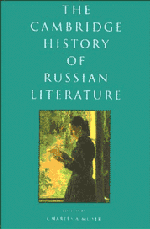Book contents
- Frontmatter
- 1 The literature of old Russia, 988–1730
- 2 The eighteenth century: neoclassicism and the Enlightenment, 1730–90
- 3 The transition to the modern age: sentimentalism and preromanticism, 1790–1820
- 4 The nineteenth century: romanticism, 1820–40
- 5 The nineteenth century: the natural school and its aftermath, 1840–55
- 6 The nineteenth century: the age of realism, 1855–80
- 7 The nineteenth century: between realism and modernism, 1880–95
- 8 Turn of a century: modernism, 1895–1925
- 9 The twentieth century: the era of socialist realism, 1925–53
- 10 The twentieth century: in search of new ways, 1953–80
- 11 Afterword: Russian literature in the 1980s
- Bibliography
2 - The eighteenth century: neoclassicism and the Enlightenment, 1730–90
Published online by Cambridge University Press: 28 March 2008
- Frontmatter
- 1 The literature of old Russia, 988–1730
- 2 The eighteenth century: neoclassicism and the Enlightenment, 1730–90
- 3 The transition to the modern age: sentimentalism and preromanticism, 1790–1820
- 4 The nineteenth century: romanticism, 1820–40
- 5 The nineteenth century: the natural school and its aftermath, 1840–55
- 6 The nineteenth century: the age of realism, 1855–80
- 7 The nineteenth century: between realism and modernism, 1880–95
- 8 Turn of a century: modernism, 1895–1925
- 9 The twentieth century: the era of socialist realism, 1925–53
- 10 The twentieth century: in search of new ways, 1953–80
- 11 Afterword: Russian literature in the 1980s
- Bibliography
Summary
Although those who came first chronologically in the history of eighteenth-century Russian literature – Antiokh Kantemir and Vasily Trediakovsky – initially wished to effect a radical break with their medieval tradition, much as Peter the Great had done in the political sphere, they could not manage it immediately. They initiated the transition to a modern literature, but it would take some time to accomplish, for the greatest literary figure of mid-century, Mikhail Lomonosov, was not so anxious as they to jettison native ways, and indeed eventually Trediakovsky too reverted to a greater sense of his roots than he had displayed in his youth, when under strong western European influence.
Although the church ceased to nurture literature directly in those years, it still continued to do so indirectly – through its schools, for example, which Lomonosov attended – and took an active hand in developing culture generally. Although literature was evidently much more secular in the eighteenth century than it had been earlier, there was still a serious religious component to it, one which emerged, for example, in Lomonosov’s “Morning meditation” and “Evening Meditation,” in Trediakovsky’s Feoptiya, and in Derzhavin’s ode “God,” promptly translated into many languages. Nor did it prove a simple matter to implant an understanding of literature as fiction: Kantemir had to explain carefully to the readers of his satires that his characters were but literary creations.
- Type
- Chapter
- Information
- The Cambridge History of Russian Literature , pp. 45 - 91Publisher: Cambridge University PressPrint publication year: 1992



